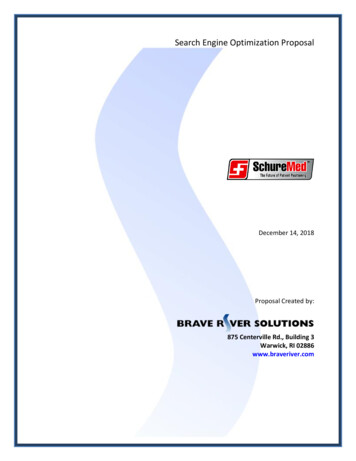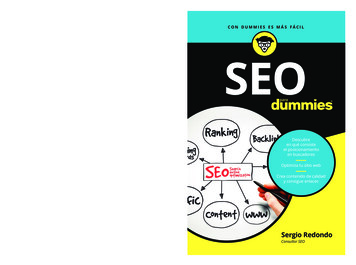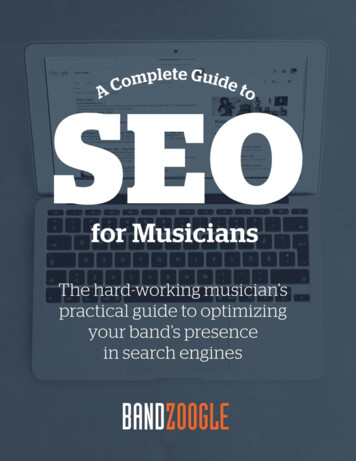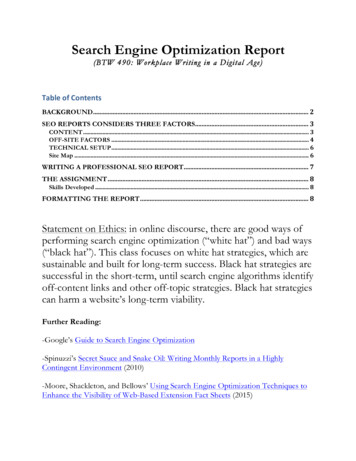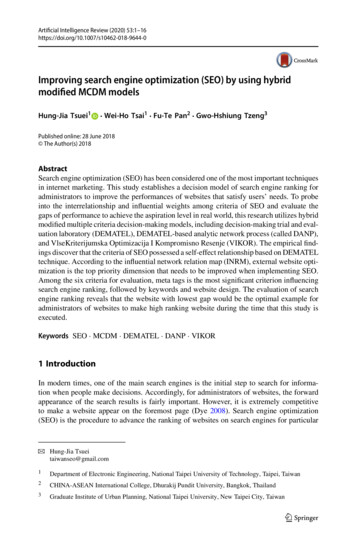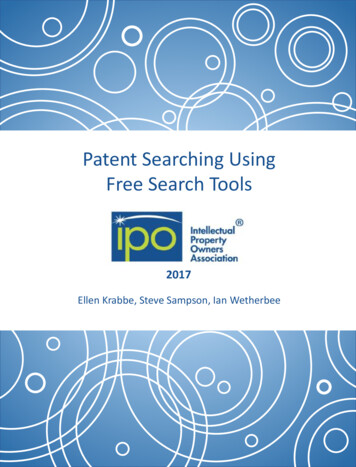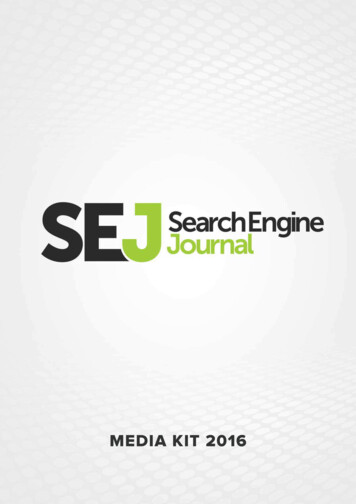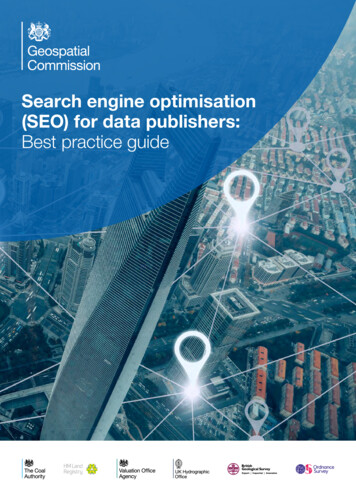
Transcription
Search engine optimisation(SEO) for data publishers:Best practice guideExpert Impartial Innovative
2Search engine optimisation (SEO) for data publishers – Best Practice GuideIntroductionThis best practice guide provides advicefor data publishers wanting to improve thefindability of their metadata (and therefore data)through search engines. The recommendationsare based on research carried out by theGeo61 on behalf of the Geospatial Commissionfor the Data Discoverability project. While theproject was focused on geospatial data, theprinciples set out below can be applied to anykind of data and data publisher.Note that these recommendations are basedexclusively on search engine optimisation (SEO)best practice and do not take into accountother factors that you may need to consider(such as compliance with metadata standards,industry norms or organisation culture). Youshould assess the risks and benefits of eachrecommendation in your own context.1 The Geo6 consists of British Geological Survey, The Coal Authority, HM Land Registry, Ordnance Survey, UK HydrographicOffice and the Valuation Office Agency.
3Search engine optimisation (SEO) for data publishers – Best Practice GuideBest practice guide1.Fill out all metadata fields on dataportals2.Keep page titles no longer than50-60 charactersWhy it’s importantWhy it’s importantThe more relevant information that exists abouta webpage, the easier it is for search engines tounderstand what the page is about. This meansthat the search engine can rank the page moreappropriately in search results. Where informationsuch as a title or abstract is missing, the searchengine has less information to work with and willbe less likely to rank it highly.If they are longer than this, they will be cutshort in search engine results pages. Seeexamples below. This could mean that keyinformation about your page is not shown. Ifusers do not understand what your page isabout from search results, they will be lesslikely to click through.What it means Make sure all the metadata fieldsavailable to you contain accurate, relevantinformation No field should be left emptyWhat it means Keep titles short but make the most of thecharacters available by using keywordsthat help users find your data Front-load the title with the most importantkeywords to maximise their impact on SEO Carry out A/B tests and use tools such asGoogle Trends to identify which keywordshave the biggest impact on the number ofpeople finding and using your dataPage title: HM Land Registry Monthly Property Transaction DataPage title: Bathymetric Survey - 2000-07-19 - Cromarty Deep Water AnchoragePage title: VOA Non domestic rating - addresses, floor areas, characteristics andattributes of propertiesExamples of page titles cut short in search engine results pages
4Search engine optimisation (SEO) for data publishers – Best Practice Guide3.Optimise the content of abstracts4.Do not include lists of keywordsWhy it’s importantWhy it’s importantAs outlined above, the more relevantinformation that exists about a webpage, theeasier it is for search engines to understandthe content and rank it appropriately. If youinclude confusing or inaccurate informationit can negatively affect the page’s position insearch results. Search engines may interpretduplicated words or content within the page asan artificial attempt to improve the SEO, andcould penalise the page as a result.Search engines are very good at recognisingartificial attempts to improve SEO and willpenalise pages that list random keywords.To be effective, keywords must form part ofthe core content of a page and should beembedded in full sentences.Examples of metadata page content not optimisedfor search enginesWhat it means Enhance all textual fields with suitablekeywords, front-loading them with the mostimportant ones Be as informative as possible but onlyinclude information relevant to the pageand avoid repeating keywords Pay particular attention to the first 120characters of any abstract as this willappear as a content preview in searchresults (alongside the title) Carry out A/B tests and use tools such asGoogle Trends to identify which keywordshave the biggest impact on the number ofpeople finding and using your dataExample of a metadata page that includes a list ofkeywordsWhat it means Make sure all page content is written innatural, full sentences Never use non-sensical text or word strings
5Search engine optimisation (SEO) for data publishers – Best Practice Guide5.Check whether you can influencethe URLWhy it’s importantResearch shows that pages with long URLsare more likely to appear low down in Googlesearch results. To avoid this, URLs shouldideally be no longer than 50-60 characters.What it means You may not have any control over thelength of a URL on your metadata pages,but should check whether you caninfluence any part of it – for example, itmight be generated using the datasettitle. If this is the case, you should aim tokeep it short and optimise it using relevantkeywords Avoid low-value words such asconjunctions and prepositions racteristics-and-attributes-of-propertiesPage titleExample of URL generated using the dataset title6.Avoid special characters where theseare not displayed correctlyWhy it’s importantSearch engines penalise webpages containinginformation that does not make sense. If youhave published metadata on a portal that doesnot recognise your special characters (such ascopyright or trademark symbols) this will havea negative impact on the page’s ranking.What it means Check how special characters aredisplayed on websites where you publishyour metadata If special characters are displayedincorrectly you should remove them If you still need to convey the sense of thecharacter (for example, to convey copyrightor trademarking) you should do this byexplaining it within the textExamples of unrecognised special characters
6Search engine optimisation (SEO) for data publishers – Best Practice Guide7.Keep the same URL if your data isupdatedWhy it’s importantPages gain authority with search engines overtime. If you create a new page, it will take timefor it to build up that authority with the searchengine and it will usually be ranked lower insearch results than a similar page that hasbeen available for longer.What it means If you have metadata that is regularlyupdated (for example, if your data isrefreshed every few months) you shouldreuse the same page (and URL) whereverpossible Avoid creating a new page each time8.Remove out-of-date pagesWhy it’s importantThe more data that is published, the harderit is for users to filter out the noise and findthe source they really want. Search enginesview recently updated pages more positivelyso pages that are out of date, or not activelymanaged, are less likely to be seen by users.If they are not seen by users they do not addvalue, but simply add to the long tail of results.What it means Design processes for managing themetadata you publish, ensuring it isregularly reviewed and removed if it is nolonger useful or relevant to users If possible, set up a permanent redirect forany pages removed so users are directedto other relevant content and do notencounter broken links Where older metadata must be maintained(for example, where it refers to a snapshotin time or is part of a series), include a linkto where users can find the most recentversion of the data
7Search engine optimisation (SEO) for data publishers – Best Practice Guide9.Avoid duplication of metadataWhy it’s importantDuplication is another issue that makes itharder for users to find the source that bestmeets their needs. This is primarily becausesearch engines usually rank duplicate contentlower than a single source, but also becauseduplicate records make it harder for users tochoose the appropriate source.There are two main types of duplication:1. similar or identical metadata availablefrom multiple publishers2. similar or identical metadata from thesame publisher, available in more thanone place1. Similar metadata available from multiple publishers
8Search engine optimisation (SEO) for data publishers – Best Practice Guide2. Identical metadata from the same publisher, available in more than one place:Source: Data.gov.uk
Search engine optimisation (SEO) for data publishers – Best Practice GuideSource: BGS WebsiteWhat it means Avoid unnecessarily duplicating metadatafor data owned by other publishers Avoid duplicating your own metadataacross multiple portals as one high qualitymetadata record will be ranked more highlyby search engines than several similarrecords on different platforms9
10Search engine optimisation (SEO) for data publishers – Best Practice Guide10. Use tools and tests to understand usersWhy it’s importantWhile there are many common principles forSEO, the target audience for your organisationwill be more nuanced than this guide. Whatworks for one organisation may be lessimpactful for another so you must understandyour users to know which levers to pull.Example of data available via Google AnalyticsWhat it means Use tools such as Google Analytics andGoogle Search Console (or equivalents)to understand the behaviour of your usersand make evidence-based decisions abouthow to reach your target audience Use techniques such as A/B tests, userresearch interviews, user surveys andobservations to inform your actions – cardsorting exercises may be a good wayto test whether users understand theterminology and keywords you are using
11Search engine optimisation (SEO) for data publishers – Best Practice Guide11. Use tools to identify the best keywords for your subjectWhy it’s importantTo choose the best keywords for the SEO ofyour webpages you need to understand: which keywords are most popular amongyour target audience how competitive those keywords are (i.e.how many other web pages are also tryingto rank highly using those words)What it means Use research tools such as Google Trendsto check search volumes for differentkeywords If appropriate, use other tools (usuallycommercial) to identify the highestranking synonyms for your keywords andunderstand how difficult it is to rank foryour preferred termsExample of how Google Trends can help inform which keywords to use
12Search engine optimisation (SEO) for data publishers – Best Practice Guide12. Apply these recommendations to allyour pagesWhy it’s importantApplying the SEO techniques above to onewebpage should have a positive impact onits findability. However, it will be negativelyimpacted by pages on the same site thathave a low SEO value. This is because searchengines treat website domains as singleentities.What it means Make sure all pages under your controlare optimised for search engines using thetechniques above If there are pages with poor SEO on thesame website that are not owned by you,consider raising it with the organisationresponsible or share this guide
a webpage, the easier it is for search engines to understand what the page is about. This means that the search engine can rank the page more appropriately in search results. Where information such as a title or abstract is missing, the search engine has less information to work with and will be less likely to rank it highly. What it means
